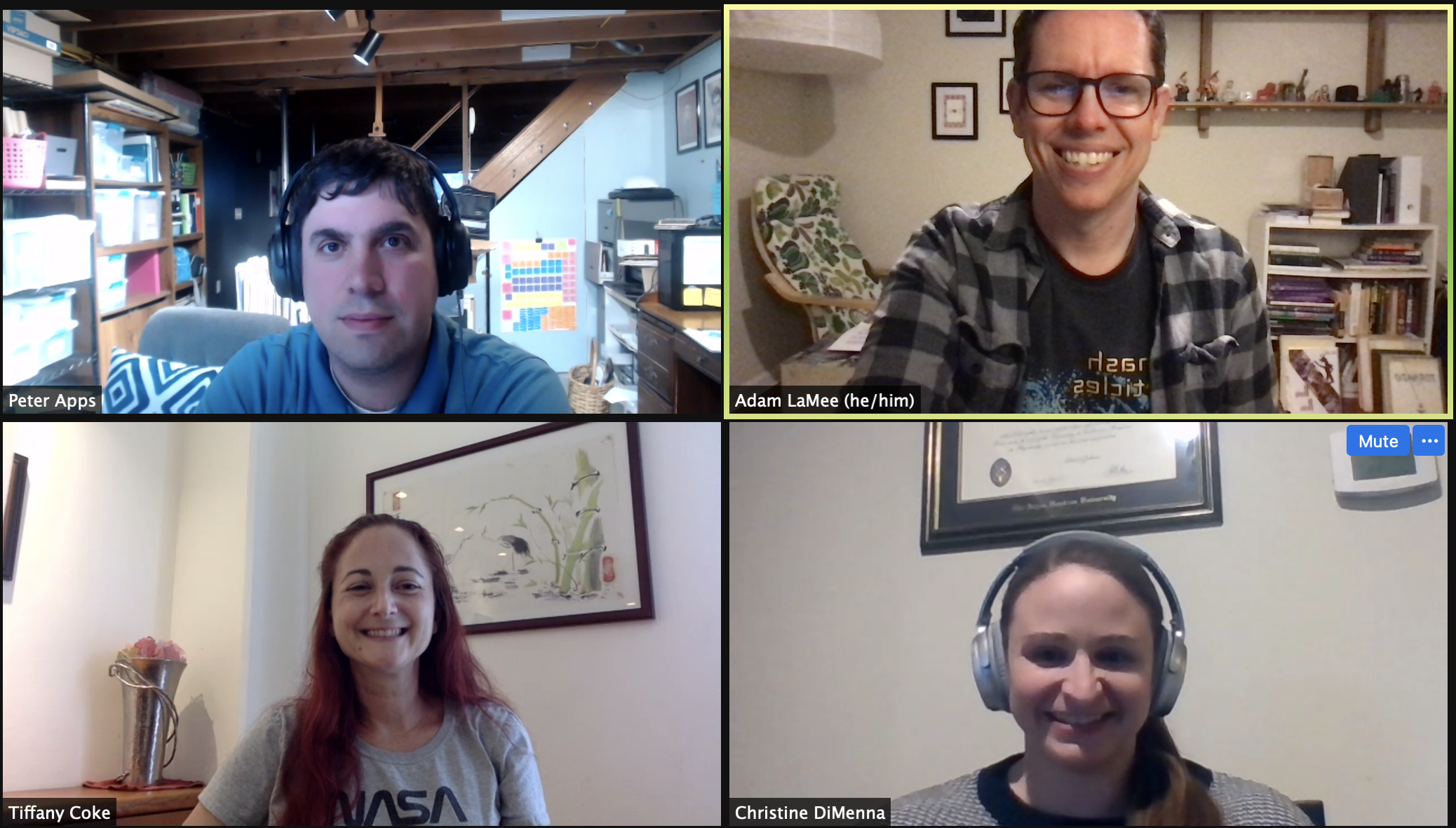Friday Flyer - March 26, 2021
The Friday Flyer comes out every other week. Look for the next flyer on April 9.

Spotlight on the Coding Fellows
We introduced the Neutrino fellows in the Friday Flyer exactly one month ago today. Now we turn our attention to another new fellows group: the Coding fellows. Adam LaMee, who has worked with the other Teaching & Learning fellows for several years to plan and facilitate Data Camp and Coding Camp, is taking the lead in this new group. We made a podcast in which you can meet these fellows and to learn what we can expect from them in the future. Check it out!

Bottom (left ot right): Tiffany Coke (U of Hawaii), Chis DiMenna (Johns Hopkins)

News from QuarkNet Central
Our next QuarkNet Educational Discussions (QED) will take place on April 7 when we will discuss the lessons and strategies from STEP UP, a program that aims to inspire more students of dеmographically unrecognized potential to pursue physics in college. Several STEP UP Ambassadors will be on hand during this QED session to share their ideas regarding the implementation of the lesson and strategies in their classrooms and to answer questions.
Another STEP UP opportunity: Teachers may apply to become a STEP UP Advοcate, one of a special group of 200+ teachers who will be provided professional development and community support in order to implement the STEP UP lessons. Advοcates may earn a stipend up to $400. The application deadline is April 2.
Beamline for Schools 2021 is on! Get basic information and a registration link in the announcement, and find more resources at the Useful Documents page.
INSPYRE (INternational School on modern PhYsics and REsearch) will host a series of lectures online on April 12–16, 2021. Registration is now open. The European School Innovation Academy has a whole menu of summer science workshops and training courses. There is no fee, but you do have to get and keep yourself there on your own. And Perimeter Institute is offering new workshops, a teacher camp, and more.

Physics Experiment Roundup
Some important breaking news on the particle physics front to report!
The LHCb (Large Hadron Collider beauty) experiment recently announced a result that, if confirmed, would suggest a possible violation of lepton flavor universality, hinting toward physics beyond the Standard Model. (Many QuarkNetters who have studied results of CMS masterclass measurements may be familiar with the idea of lepton universality, noting that the masterclass data indicates Z bosons, for instance, are just as likely to decay into muons as they are to decay into electrons.) This result is not yet confirmed, as physicists have not yet reached the five-sigma gold standard for a discovery. Stay tuned!!
The Fermilab DZero collaboration (dating back to the Tevatron era!) along with the LHC's TOTEM collaboration recently jointly announced the discovery of the odderon, a three-gluon particle that has been hypothesized since the early 1970s. Discovering this elusive particle required detailed measurements from glancing collisions of high-energy protons (TOTEM) or protons/antiprotons (DZero).

Resources
Did you know that "Standard Model" was a placeholder of a name that never was replaced? Learn more about this and five other facts about the Standard Model in this article from symmetry. Also from symmetry, physicists make progress on a problem in understanding the evolution of black holes.
The remaining resources make up today's Friday Flyer Resources (short) Film Festival. From Fermilab, Don Lincoln describes the MAGIS-100 detector, Kirsty Duffy discusses neutrino detectors in the latest installment of the Even Bananas series, and if you have a bit more time, check out the public lecture by Gerald Gabrielse on antimatter and other deep mysteries. From Veritasium, calculating (pizza) Pi, and from the Physics Girl's Physics 101 series: electric charge and light and voltage, resistance, and current.

Just for Fun
A new diagram of the solar system from xkcd from a unique point of view. Also from xkcd: Circles.
Lastly, we leave you with a tweet from Neil deGrassee Tyson in which he points out a milestone recently reached by William Shatner: traveling 52,600,000,000 miles in his lifetime. Happy 90th, Mr. Shatner! (I'm sure he reads the Friday Flyer; right?!)
QuarkNet Staff:
Mark Adams: adams@fnal.gov
Ken Cecire: kcecire@nd.edu
Spencer Pasero: spasero@fnal.gov
Shane Wood: swood5@nd.edu
